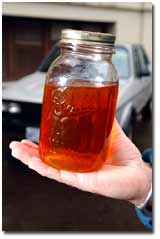|
What is biodiesel?

Biodiesel is a clean burning fuel that comes from natural,
biodegradable, non-toxic and renewable sources. Biodiesel can be used in any unmodified diesel engine. Most biodiesel fuel is made when new or used vegetable oils and animal fats
are combined with alcohol (usually methanol), causing a chemical reaction that produces compounds known as "fatty acid methyl esters".
Glycerol/glycerin is also produced by this process. Glycerol/glycerin can be used to make soap and many other products.
According to the website Biodiesel.org, Biodiesel is registered as a fuel and fuel additive with the
Environmental Protection Agency (EPA) and meets clean diesel standards established by the
California Air Resources Board (CARB).
Neat (100 percent) biodiesel has been designated as an alternative fuel by the Department of Energy (DOE)
and the US Department of
Transportation (DOT).
Biodiesel's Physical Characteristics:
Specific gravity 0.87 to 0.89
Kinematic viscosity @ 40°C 3.7 to 5.8
Cetane number 46 to 70
Higher heating value (btu/lb) 16,928 to 17,996
Sulfur, wt% 0.0 to 0.0024
Cloud point °C -11 to 16
Pour point °C -15 to 13
Iodine number 60 to 135
Lower heating value (btu/lb) 15,700 to 16,735
Back to the BioDiesel Betty Homepage
|



